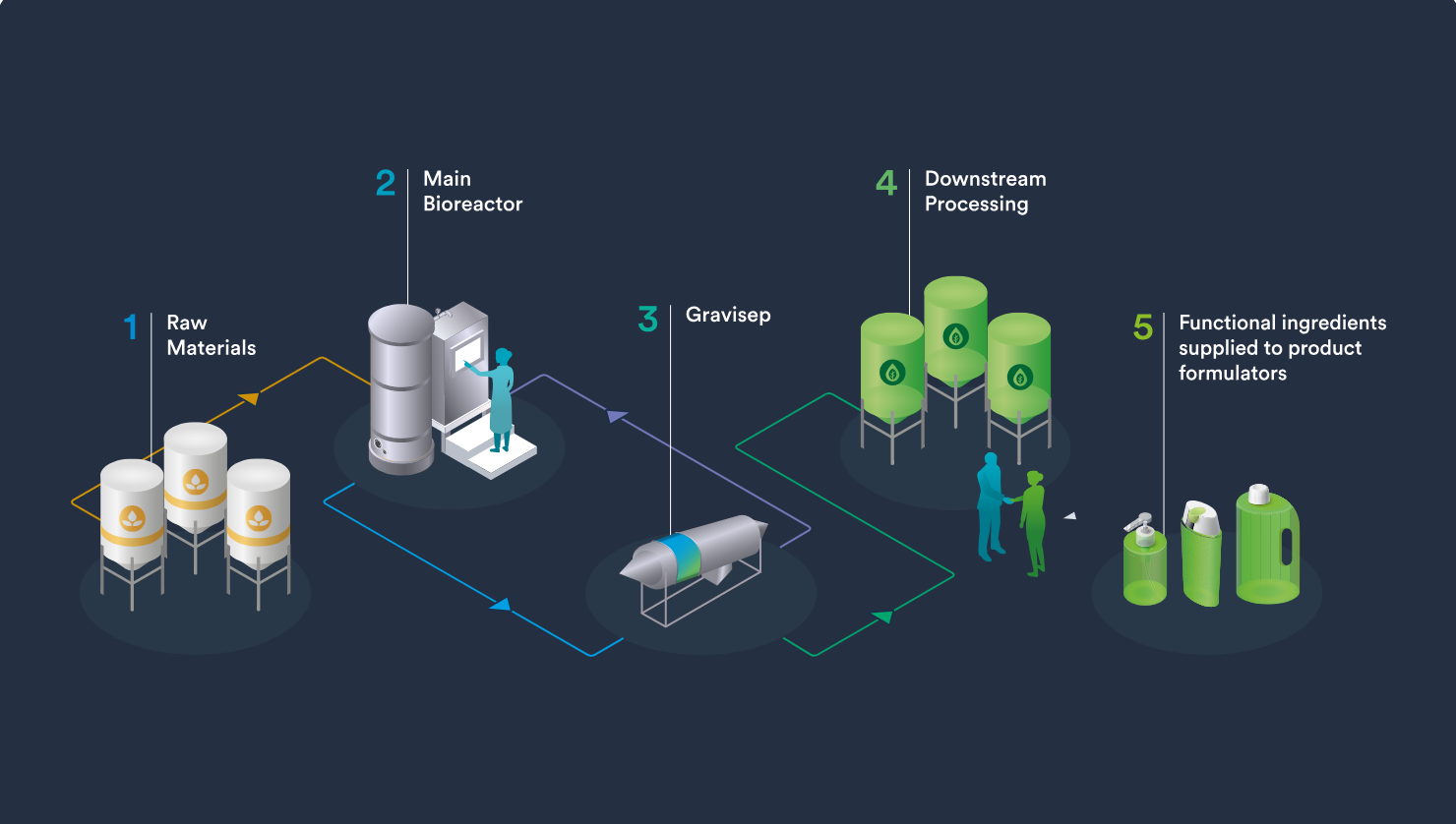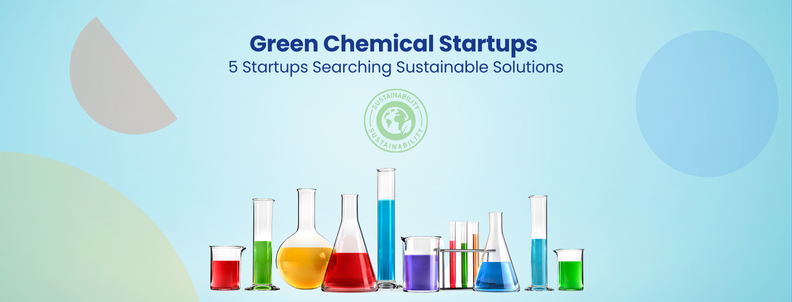Industrial chemicals are the backbone of pharmaceuticals, agriculture, and consumer goods manufacturing processes. While effective, these conventional chemicals often pose significant environmental risks due to their toxic constituents and energy-intensive production processes.
The challenges associated with these chemicals include pollution, high greenhouse gas emissions, and health risks.
The increasing global emphasis on sustainability has sparked a revolution in the search for safer, more environmentally friendly alternatives. Green chemicals, designed to reduce or eliminate the use and generation of hazardous substances, are at the forefront of this revolution.
These eco-friendly industrial chemical alternatives benefit the environment, enhance process efficiency, and reduce long-term operational costs.
This article explores five growth-stage startups in the chemical sector working on replacing harmful industrial chemicals with green chemicals. These startups have rapid growth potential, are in a good market position, or can introduce game-changing technology to the market in the next 2-3 years.
This makes them a great option to partner, collaborate, or acquire.
1. DUDE CHEM Developing Greener APIs with Small Molecule Recepies
| Founding Year | 2019 |
| Headquarters | Berlin, Germany |
| Total Funding Amount | €9.2M |
| Last Funding Round/Amount | €6.5M/Seed Round |
| Website | https://www.dudechem.com/ |
Homogeneous catalysts in chemical manufacturing enhance efficiency but can only be used once due to stability issues, increasing costs. Additionally, chemical process waste poses environmental and financial management challenges. High costs also stem from energy, raw materials, and technology needs. These factors highlight the industry’s urgency for sustainable and cost-effective practices.
DUDE CHEM addresses these challenges of chemical manufacturing by developing greener active pharmaceutical ingredients (APIs) and intermediates with its unique small molecule recipes that reduce the cost of goods sold (COGS) by at least 10% for innovative and generic APIs.
The startup meticulously assesses sustainability and synthesis routes to enhance process efficiency through optimization and rigorous analysis. It helps in high product quality and sustainability.
One of the DUDE CHEM sustainability methods can reduce catalyst costs by up to 82% in recovering expensive catalysts like chiral using cost-effective and accessible solvents like water rather than licensed “designer surfactants” for conducting reactions.
The market-validated and patented green tech toolbox of this startup offers cost-competitive chemical compounds that can reduce average CO2 emissions by 38%.
Co-founder and CEO Sonja Jost is leading this startup with a team of expert executives. She has experience with R&D project lead roles and is the CEO of DexLeChem GmbH. Jost holds a Master’s degree in chemistry from the Institute of Chemistry at the University of Technology Berlin and is Vice president of CCI Berlin.
DUDE CHEM has raised €6.5M in its latest seed funding round on Feb 7, 2024. B2ventures (BTov Partners) and Vorwerk Ventures were the lead investors in this round.
2. Ayas Renewables Converting Vegetables into Bio-renewable Chemicals
| Founding Year | 2015 |
| Headquarters | Alabama, United States |
| Total Funding Amount | $7.7M |
| Last Funding Round/Amount | Series A/- |
| Website | https://ayasrenewables.com/ |
Existing petrochemical propylene glycol is derived from fossil fuels, contributing to carbon emissions and the depletion of non-renewable resources. It also causes environmental pollution from its production and use. Health concerns related to exposure and its use in products need a shift towards more sustainable, bio-based alternatives. Also, sustainable (green) chemical production faces challenges, including high costs of green technologies, reliance on non-renewable resources, and environmental impacts of waste and emissions.
Ayas Renewables tackles these challenges by converting vegetable and tallow processing byproducts into Bio-renewable chemicals.
The startup produces 99.9% pure, US Pharma Grade Propylene Glycol from 100% natural bio-based feedstocks like glycerin and sorbitol. It offers a biodegradable, FDA-approved, and cost-competitive alternative to petrochemicals in all markets.
Ayas Renewables’ proprietary process is in the second-generation vapor phase. The low-cost process has a low-temperature, low-pressure, hazardous acid, and exotic catalysts-free nature. With the same or less cost, the startup offers all markets the opportunity to replace petrochemical propylene glycol with a 100% bio-renewable sustainable alternative.
The startup is led by CEO Joe McGrail, who has 21+ years of experience in president and MD roles. Ayas Renewables raised a Series A round on Aug 22, 2022.
Intrigued by these innovative startups?
Subscribe for more information on chemical industry startups that are solving the core challenges of your industry.

3. Impact Nano Making Green Impact on Semiconductor Chemicals
| Founding Year | 2019 |
| Headquarters | Massachusetts, United States |
| Total Funding Amount | $32M |
| Last Funding Round/Amount | Venture Round/$32M |
| Website | https://impact-nano.com/ |
Supply chain vulnerabilities caused by geopolitical events like the Ukraine conflict affect the neon gas and chemical supply. Impact Nano aims to balance the supply of chemicals and bridge the gap in semiconductor chip demand and supply by enhancing chemical production for semiconductors. It also focuses on purity, ethical raw material sourcing, environmental sustainability, and the ecological impact of chemical production.
The startup innovations are pivotal for advanced chip manufacturing, particularly for extreme ultraviolet lithography (EUV) processes.
Impact Nano is a tier 2 advanced materials supplier specializing in ligand, organometallic, silicon, and fluorine chemistry. It is equipped to handle air-sensitive materials safely, showcasing its comprehensive capabilities in the chemical manufacturing landscape.
Co-founder and CEO Matthew D. Stephens has 20+ years of experience commercializing advanced materials. He has experience in VP and C-level leadership roles at companies like Voltaix and Metem. Stephens holds a Ph.D. in Chemistry from the University of Wisconsin-Madison and an MBA from INSEAD. He is a co-inventor of over a dozen US patents.
Impact Nano raised $32 Million in a Venture – Series Unknown round on May 4, 2023. One of the investors in this round is Intel Capital, an investment arm of U.S. chip giant Intel Corp. The startup will use this funding amount to expand the Massachusetts factory.
4. Brisil Replacing Sand in Advanced Grade Green Silica Production
| Founding Year | 2016 |
| Headquarters | Gujarat, India |
| Total Funding Amount | Undisclosed |
| Last Funding Round/Amount | Undisclosed |
| Website | https://www.brisil.com/ |
Rice husk ash is a leftover from using rice husk as fuel in industrial boilers and power plants. Over 20 million tons of rice husk ash are generated annually around the globe and landfilled or dumped in open grounds. Industries using rice husk as fuel in boilers and power plants face the challenge of dumping rice husk ash. With increasingly stringent pollution norms, getting rid of rice husk ash is becoming difficult.
Brisil is a startup that engages with rice husk & rice husk ash-producing industries and sets up production plants based on the technology.
The startup produces rice husk ash-based green precipitated silica, highly dispersible (Advanced-Grade) silica, and other chemicals. It uses a zero-waste chemical process to extract silica from rice husk ash. About
Brisil’s commercialized technology efficiently extracts up to 70% silica from rice husk ash for diverse applications, including tires, rubber, footwear, paints, coatings, toothpaste, food, and pharmaceuticals. Its advanced-grade, highly dispersible silica improves the performance of energy-efficient green tires.
In contrast to conventional sand methods, the startup’s process uses rice husk ash as a base material. It yields better quality silica and demands significantly less energy, enhancing efficiency and sustainability. The process is fully automated, ensuring consistent product quality tailored to user requirements.
Brisil Technology is led by CEO and Founder Director Tanmay Pandya, who holds a B.Tech in Chemical Engineering from the Indian Institute of Technology, BHU.
The startup raised $30.9K in a seed funding round on Nov 30, 2018. It is backed by the Centre for Innovation Incubation & Entrepreneurship (CCIE), IIM Ahmedabad.
5. Holiferm Upgrading Traditional Fermentation for Producing Bio-based Surfactants
| Founding Year | 2018 |
| Headquarters | Manchester, United Kingdom |
| Total Funding Amount | $32.8M |
| Last Funding Round/Amount | Series B/£18.5M |
| Website | https://holiferm.com/ |
Sustainable bioproducts need to be made more accessible and affordable and replaced with environmentally harmful petrochemicals in various industries. This will help achieve sustainability and reduce the environmental footprint of chemical production, promoting green chemistry.
Holiferm is paving the way for more sustainable manufacturing practices by developing processes that facilitate the commercial-scale production of biosurfactants.
The company spearheads transitioning to a biosurfactant-based economy with natural fermentation processes, manufacturing non-toxic, renewable materials for industrial and consumer products. Its technology transforms conventional batch fermentation into efficient continuous processes with patented integrated gravity separation technology.

Focusing on expanding its product range to include various biosurfactants like MELs and rhamnolipids, the startup is working towards creating a more diverse and sustainable portfolio of products suitable for personal and home care applications.
The startup is progressing under the leadership of CEO and founder Ben Dolman, with a team of expert engineers, scientists, and executives. Dolman holds a Master’s degree in Chemical Engineering from the University of Manchester and was a PhD researcher. He has experience in consultant roles.
Holiferm raised £ 18.5 million in a series B round on 06 December 2023 from Rhapsody Venture Partners and Clean Growth Fund. It plans to use this funding to scale up its commercial plant from a capacity of 1.1 KTA to 3.5 KTA by installing new fermenters and machinery.
Partner with cutting-edge startups to tackle your industry’s toughest challenges and stay on top of the competition.
Learn how we can help you discover similar ventures that perfectly fit your needs.

Author: Naveen Kumar, Marketing.










